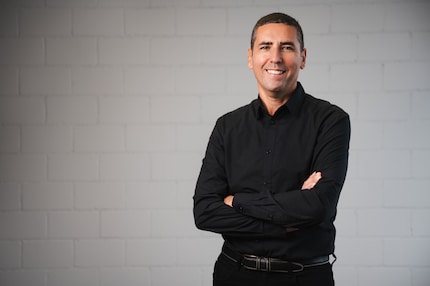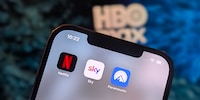
Background information
Apple TV+: what happened to the world’s most expensive streaming experiment?
by Luca Fontana

Sky CEO Eric Grignon explains why streaming today is more overwhelming than inspiring and what needs to change. We discuss series cancellations, algorithms and how Sky is about to offer more than just television in Switzerland.
With too many apps and series and not enough overview, streaming often feels like a second job these days. Eric Grignon knows this feeling all too well. The CEO of Sky Switzerland has been observing the market for years and sees parallels with the TV revolution of the 80s. At that time, viewers were inundated with a flood of new channels. Today, swap channels with platforms.
So, what does Eric say the answer is? Aggregation instead of isolation.
He wants Sky to be the place to go for sports fans as well as series junkies. In an interview, the CEO talks openly about Sky Originals, HBO content, the challenge of personalisation, and why it sometimes makes sense to cancel popular series. At the end, he even reveals that Sky soon wants to provide content online as well nationally in Switzerland.

Eric, when I ask around, streaming feels like a second job for many people. There are too many services and series and just not enough time. What do you think?
(laughs) I get that. There really are a lot of streaming platforms out there now, and that can be confusing. Which series is on where? What platform is airing the next football match? It’s complicated and reminds me of the TV explosion in the 80s and 90s with satellite and cable. My parents, for example, were also completely overwhelmed at the time.
And these days, would you say streaming is practically the new satellite TV?
Exactly. We’ve almost come full circle. First came the pioneers like Netflix, then everyone jumped on the streaming bandwagon. Now it’s just chaos. The logical next phase is aggregation. In other words, bundling content and creating some sort of direction.
And that’s exactly where Sky wants to start, I assume.
It’s already started, in sport at least. When you open the Sky Sports app, you’ll see our exclusive Sky content, such as the German Bundesliga, English Premier League and Formula 1. But alongside that, you’ll also find UEFA Champions League matches from Blue, the Ice Hockey National League from MySports and other content from DAZN, even if you have to pay extra for other providers’ content. Having so much sport bundled in one app is currently unrivalled.
«I firmly believe that the future belongs to aggregators.»
Is this also the case for series and films?
Not yet, but we’re working on it. I’m sure there’ll be platforms that bundle content from different providers, curated, sorted by topic and perfectly personalised. What I mean is, if someone loves crime series, they’d be able to find all of that in one place, even if they’re actually spread across several streaming services.
But isn’t that also in conflict with most streaming services’ business models?
Of course. Every provider wants to sell its own content. I get it. But if everyone does everything on their own, customers lose out in the end. That’s why I firmly believe that the future belongs to aggregators. In other words, services with smart models that don’t force everything on people and instead only deliver and make them pay for what they really want to see.
That sounds like a dream. But I can see where that might pose a challenge. Netflix, for example, defines itself through in-house productions such as Stranger Things and Squid Game, Disney+ through brands such as Marvel and Star Wars. How do you define your identity when there’s no exclusivity?
That’s a very good question. If you want to survive, you need both aggregation and exclusive content. And that’s where Universal Studios, Sky Originals and HBO come in. In Switzerland, we have the exclusive rights to distribute all productions from these major studios. This is a huge competitive advantage for us.
«I can’t comment on whether HBO Max will launch in Switzerland. However, we are in talks with Warner Bros. We very much hope to pursue this partnership.»
So without HBO, Sky Show wouldn’t be what it is today?
Not quite. We have lots of other exclusive productions from our partner NBC Universal as well as our own Sky productions. But HBO content is definitely an important part of what we offer. The Last of Us, Succession, House of the Dragon, The White Lotus – these are all series that also help shape our brand identity.
But for how much longer? In Germany, Warner wants to launch HBO Max as early as next year (site in German). Is this also in the works for Switzerland?
I can’t comment on whether HBO Max will launch in Switzerland. However, we are in talks with Warner Bros. And of course, I’d assume we’d be keen to launch HBO Max in Switzerland as well. But the market here is different. Sky is currently the number two provider of fictional content in Switzerland. This is an attractive starting position for all partners, including Warner. So, we very much hope to pursue this partnership.
Is that because HBO isn’t just content for you, but more about brand essence that lets you differentiate from the competition?
Not really. Our Sky productions, both in-house and co-produced such as Tschugger, Chernobyl, Gangs of London and the highly acclaimed The Day of the Jackal, characterise our brand just as much as HBO. Not to mention that sports are also an important part of Sky. And yes, productions like this and exclusive rights cost a lot of money. But it’s worth it. That’s why we pay a lot to secure such exclusivity.
«If HBO ever jumps ship, we’ll have to adapt.»
What if HBO jumps ship at some point?
Then we’d have to adapt. But I’m confident we’ll find a solution together. The market in Switzerland is too small for ten individual apps. For both parties, it’s worth cooperating.
That’s true. For instance, you just mentioned that Sky is the number two in Switzerland for fictional content. What does that mean? How precisely do you measure that? Is it according to viewer numbers? Or by minutes streamed?
We look at actual consumption. In other words, who streams how much and where? In the networks, you can clearly see which apps generate the most data traffic. Of course, Netflix is clearly in the lead – you can’t dispute that. But in Switzerland, Sky follows in second place. While Disney+ has strong brands, it features a comparatively small catalogue. And Prime Video isn’t as dominant in Switzerland as in other markets, such as Germany or the UK. That gives us room to manoeuvre.
Does that mean that, with the help of HBO, your parent company NBC Universal and co-productions, you’re stronger than Disney+ purely in terms of data volume?
It would appear so. This is due to big-name series as well as the fact we position the content well locally. If you’ve been to Zurich recently, you’ll have seen The Last of Us on posters everywhere. We don’t just air content. We’re building a brand.
An entirely different question that keeps coming up in discussions with our readers: why are strong series being increasingly cancelled? One such example is Chaos on Netflix. It received critical acclaim and good numbers, yet it’s over after one season. What’s going wrong?
Yes, this is a phenomenon that also frustrates us in the industry. But there’s rarely just one reason. These days, it doesn’t cut it for lots of people to simply watch a series and tweet about it. The decisive factor is: how many really stick with it? How many watch episode one and how many carry on till the end of the season?
So, engagement is more important than reach?
I’d say they’re equally important. A series can have a great start, but if people give up on it part way through, that’s a bad sign. It could mean the marketing was strong but the content wasn’t. We analyse this very closely, right down to the question of whether anyone has seen the last minute of the last episode. This is data that didn’t exist ten years ago.
«We used to have to guess which series might work. Now, we can predict it pretty accurately.»
But sometimes you get the feeling that it’s not about quality at all and just about what could perform even better.
That certainly also plays a part. Series cost a lot of money, and there’s always a backlog of projects. If I have a budget – let’s say a million francs – then I have to decide: do I continue with this series that’s doing well? Or do I invest in a new project that could perhaps do even better? It’s the classic opportunity-cost conflict.
That sounds brutal.
It is. And sometimes there’s more to it than that. There could be strikes, actors who no longer want to continue, scheduling problems and political circumstances. All of this can lead to a series not continuing despite its success.
So it’s not purely an algorithm decision?
It doesn’t just come down to that. But of course, algorithms give us tools, whereas in the past, we had to rely on just gut decisions. Whether you see this as a blessing or a curse is a matter of opinion. We used to have to guess what people might like. Today we have data analysis that can tell us this pretty accurately. I’d even say that there are now more outstanding series per year than ever before. This is no coincidence.
«At the end of the day, we’re still storytellers. Creativity remains central to what we do. I see data as a tool that helps us to understand what works and what doesn’t."
But then, wouldn’t you say creativity is increasingly being replaced by algorithms? Take the simple example of a creative who might want to film a blue house, but the data model shows people want a red house. So that’s what they ultimately film. Isn’t that a killer for bold ideas?
I get what you mean, and yes, we often have this discussion. But I still think it’s much better today than it was ten years ago. Back then, a lot of it was really just gut feeling. You didn’t know if a film would work until the box office was there on the first weekend. Today, we have more data, more control – and can assess risks better.
But doesn’t that eventually replace artistic intuition? Those happy little accidents when something totally unique and ingenious happens by chance?
I hope not. At the end of the day, we’re still storytellers. Creativity remains central to what we do. I see data as a tool that helps us to understand what works, why and for whom. But when it comes down to it, people still have to decide.
«In future, Sky will deliver content as well as internet and mobile in Switzerland."
Eric, to conclude, you’ve hinted at something that goes far beyond streaming. Do you have a mini spoiler for 2025?
(laughs) Yes, here’s a small premiere at the very end. As well as providing content in Switzerland, in future the company is also set to supply internet and mobile. Just as we already do in countries such as the UK, Ireland and Italy.
In other words, Sky as a telecom provider, not just a streaming platform?
Exactly. In concrete terms, this means: internet access, mobile offers, perhaps even bundles with streaming services. I can’t reveal more than that at the moment. But yes, Sky will be more than just Sky Show and Sky Sport in Switzerland in 2025.
Was I the first to hear about this?
(laughs) Nothing has been officially announced yet – so in a way, yes. Let’s just say: stay tuned.
Perfect. That’s a wrap. Thanks very much for the interview.
Eric Grignon has been CEO of Sky Switzerland since 2017. Born in France, he has helped shape the streaming market in Switzerland from the very beginning – first as head of Homedia, where he transformed the DVD-by-mail service Hollystar into the largest independent streaming platform in the country. Prior to that, he worked for companies such as Orange and Nokia. Today, Eric is at the helm of Sky Switzerland.
I write about technology as if it were cinema, and about films as if they were real life. Between bits and blockbusters, I’m after stories that move people, not just generate clicks. And yes – sometimes I listen to film scores louder than I probably should.
Interesting facts about products, behind-the-scenes looks at manufacturers and deep-dives on interesting people.
Show all
Background information
by Luca Fontana

Background information
by Cassie Mammone

Background information
by Luca Fontana